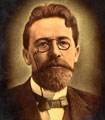Anton Chekhov :The Fat Man and the Thin Man
Anton Chekhov
Anton Chekhov was born in 1860, in Taganrog, Russia, on the Sea of Azov. The third of six surviving children, he grew to become one of the greatest short-story writers and playwrights known in world literature. His most famous plays include The Three Sisters (1901) and The Cherry Orchard (1904), the latter becoming a classic of modern drama. Chekhov worked as a doctor throughout
most of his literary career, commenting, “Medicine is my lawful wife, and literature is my mistress.” He died in 1904, in Germany, after a period of termi

Written by Anton Chekhov
Sunday, 29 June 2008
Anton Chekhov was born in 1860, in Taganrog, Russia, on the Sea of Azov. The third of six surviving children, he grew to become one of the greatest short-story writers and playwrights known in world literature. His most famous plays include The Three Sisters (1901) and The Cherry Orchard (1904), the latter becoming a classic of modern drama. Chekhov worked as a doctor throughout
most of his literary career, commenting, “Medicine is my lawful wife, and literature is my mistress.” He died in 1904, in Germany, after a period of terminal illness.
‘The Fat Man and the Thin Man’ by Anton Chekhov
Two men met at the Nikolayevsky Railway station, one fat, the other thin. The fat one had only just dined in the restaurant, and his butter-smeared lips were as glossy as ripe cherries. He smelt of sherry and perfume. The thin one had only just emerged from his railway carriage and was burdened with suitcases, bundles and cardboard boxes. He smelt of ham and coffee grounds. From behind his back peered a skinny little woman with a long chin—his wife, and a tall high-school boy with a squint in one eye—his son.
‘Porfiry!’ exclaimed the fat one on seeing the thin one.
‘Is that you, my dear chap! But it’s been ages!’
‘Good gracious!’ said the thin one in amazement.
‘Misha! My childhood friend! Wherever did you spring from?’
The friends embraced three times and gazed at one another with eyes full of tears. Both were agreeably flabbergasted.
‘My dear fellow!’ began the thin one after the greetings were over.
‘I never expected it! What a surprise! Come on, let me have a good look at you! The same handsome fellow you always were! The same charmer and dandy!
Good Lord! But how about you, my friend! Rich? Married! I’m married now, as you see… This is my wife, Louisa, née Wantzenbach…. a Lutheran. And this is my son, Nathaniel, third-former. Nattie, this is my childhood friend!
We were at high school together!’Nathaniel reflected for a moment and then doffed his cap. ‘We were at high school together!’ continued the thin one.
‘Remember how they teased you? They called you Herostratus because you burnt a hole in the school register, and they called me Ephialtes because I loved telling tales. Ho, ho! We were children!
Don’t be shy, Nattie. Go nearer to the gentleman… And this is my wife, née Wanzenbach… a Lutheran…’Nathaniel reflected for a moment and hid behind his father’s back.
‘Well, how are you getting on, my friend?’ asked the fat man, looking delightedly at the other. ‘Are you in government service somewhere? Have you done well?’
‘I’m in the service, my dear fellow! I’m in my second year as collegiate assessor, and I have the Order of St Stanislaus. The salary’s poor… but what can I do? My wife gives music lessons and I make wooden cigar-cases on the side. Excellent cigar-cases! I sell them at a ruble apiece. If anyone takes ten or more, then he gets a discount.
We’re managing quite nicely, one way or another. I am in the civil service you know, and now I’ve been transformed here as head of section in the same ministry. I shall be working here. Well, and how are you? I’ll bet you’re a state councillor already, eh?’
‘No, my dear fellow, promote me a little higher,’ said the fat man. ‘I have already worked my way up to privy councillor. I have two stars.
’The thin man suddenly went pale and seemed petrified; but his face was soon distorted in all directions by the broadest of smiles: it was as if sparks were showering from his face and eyes. He cringed, cowered, shrivelled… His suitcases, bundles and cardboard boxes also cringed and shrivelled…
His wife’s long chin became even longer; Nathaniel drew himself up to attention and fastened all the buttons on his school uniform.‘Your Excellency, I… A pleasure, sir! Childhood friend, one might say, and suddenly such an important person! Hee, hee!’
‘That’ll do!’ frowned the fat man.
‘Why that tone of voice? You and I were childhood friends—what’s the point of the servility?’
‘Be so kind… Indeed, sir…’ giggled the thin man, cringing even more. ‘Your Excellency’s gracious attention is, as it were, a life-giving balm… This, Your Excellency, is my son Nathaniel… My wife Louisa, a Lutheran, in a manner of speaking…’
The fat man waned to object, but there was so much reverence, sweetness and respectful sourness written on the thin man’s face that the privy councillor felt sick.
He turned away from the thin one and put out his hand in farewell. The thin one squeezed three fingers, bowed with his whole body and giggled like a Chinaman*: ‘Hee, hee, hee!’ His wife smiled. Nathaniel scraped his foot and dropped his cap. All three were agreeably flabbergasted. * This phrase is considered offensive in the present day.